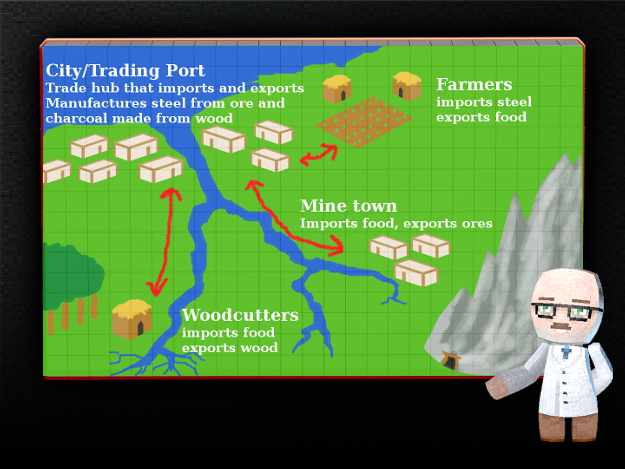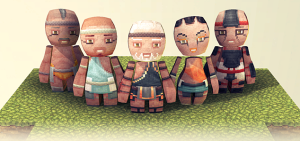This week, we’re talking about another non-violent (or at least, primarily non-violent) approach to the game: Being a merchant.
Although games about combat are common, there is also a small but thriving genre of games based around the concept of being a merchant trader, and even when that’s pretty much all you do, the games can be quite fun.
Demand More Than Supply

In Imagine Nations, we won’t have artificial constraints of towns only producing specific goods, and really wanting specific goods that are determined in advance: We’ll simply have resources, technologies, regional training/skill levels, and trade routes that, over time, help to establish different cultures or villages as being capable of producing excesses of some good or another, and being dependent upon trade for another. Unlike games that are set strictly in a historical setting, your actions can bring towns and their markets into bloom, or shrivel their opportunities.
New towns are often formed based upon the “flags” discussed in earlier posts identifying new resource points to exploit. When a town can’t effectively reach a flag, they consider building new towns. Because new towns can be within reach of several flags, it can very well be that unusual combinations of resources occur at the same town.
More than just a supply-and-demand system, towns in Imagine Nations will be reactive to the conditions they are in, and what is traded with them; If they have no ores of their own, but plenty of fertile soil, a town or culture may naturally become a bread basket with little metallurgical industry, but plenty of farms. This can influence their cultural outlook, and how they choose to expand. If they are dependent upon trade for raw materials or weapons early on, then having those needs reliably met means that as they start to expand and grow as a town, they become a more and more voracious consumer of those types of goods they do not have the capacity to satisfy, themselves. This may lead to shortage and disaster, or the opportunity to expand those towns that feed the appetites of the expanding city.
Buying Loyalty
Also, in this game, relationships will be an important factor: You might be able to trade your way up the political ladder with proper gifts or graces with individual relationships, but also establish and negotiate relations between nations with otherwise chilly relations. (Or even manipulate conflicting nations from the shadows.)
There is also the factor of individual relationships with subordinates – we want to make it possible to set up underlings to handle tasks automatically, and take away the need to manage a whole trade empire manually. Your factories, trade ships, or even private security can all have underlings and possibly even managers to handle routine problems. Eventually, managing your trade empire may be virtually indistinguishable from a management of a city if you build up enough, but probably with less need to worry about popularity polls.
When you have so much economic power, and the world is based upon interrelated relationships that you can manipulate with economics, you might be able to see just how deep the simulation rabbit-hole goes and enjoy seeing how cutting off the iron supply to an isolated culture alters their development compared to when you keep it flowing.
Because this is a game with no static nations or empires, when we say how you choose to horde, share, or spend your wealth can have consequences, those consequences can be whether or not an empire stands eternal or crumbles to dust, and how that empire looks upon the rest of the world. You can influence the technology growth rate of nations, and ensure that the nations most favorable to your style of play have all the resources it needs to stretch their grasp to the stars… and when they do, you’ll be ready to exploit every last resource within reach. Whether that is to build a pleasure palace of solid gold or ensure a peaceful and stable society is up to you.
- Imagine Nations Team
Thank you for supporting our game and campaign as we work towards a first build.



"palace of solid gold" I now have a goal.